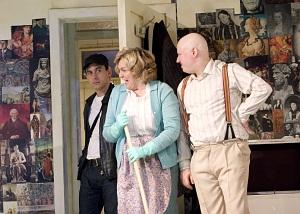Prick Up Your Ears
Recently, there's been a veritable rash of stage plays based on successful films, or focusing on the same material. 'Prick Up Your Ears' is another in this genre, and follows in the filmic footsteps of the 1987 version (with the same title).
Based on the lives of playwright Joe Orton and his partner Kenneth Halliwell, the play harks back to the London of the swinging 60s. After years living on National Assistance in almost total obscurity, this star-crossed pair were incarcerated in prison for defacing Islington Council's library books. But when Joe Orton returned to the studio flat he shared with Halliwell in Noel Road, things were never to be the same. Orton found fame via the radio and then with 2 highly successful stage plays 'Entertaining Mr Sloane' and 'Loot'. Before long, Orton was offered scriptwriting deals by the likes of The Beatles, and was honoured in the Evening Standard's glitzy awards. But partner Halliwell, left in the darkening shadow of his partner's glory, descended into deep depression, and on the night of August 9 1967 used a hammer to smash Orton's skull and then committed suicide with 22 Nembutal tablets. The irony was that Halliwell died first.
A single set of the living room/bedroom at Noel Road, where Orton and Halliwell spent most of their lives together, provides the claustrophobic atmosphere which is almost essential in understanding the nature of the relationship. As the drama unfolds, Halliwell's collages on the walls multiply mirroring, in some respects, what was going on in his head.
Orton is played by Chris New, and Kenneth Halliwell by 'Little Britain' star Matt Lucas. Since the story is told largely from Halliwell's point of view, more of our attention is focused on Matt Lucas. But until the middle of the second act, I couldn't believe in Lucas's portrayal because it is almost a concoction of characterisations that are grossly overdone making Halliwell appear grotesquely silly at times. However, an argument about a letter introduced some real tension, and in the last 15 minutes or so, Lucas did capture Halliwell's mental collapse. Chris New's Orton, on the other hand, is authentically energetic, eager to obtain the rewards of fame, and develops an iciness towards Halliwell as the play progresses that explains much about the outcome.
The cast is completed by Gwen Taylor as Mrs Corden, the somewhat naïve neighbour in the house at Noel Road. Although Ms Taylor provides fine support in the comedy department, the role seems disproportionately large, even if it does provide relief from the increasing tension of the central relationship.
As with the other recent transfers from screen to stage, it's impossible to avoid making comparisons even though each version really ought be be judged on its own merits. In this stage production we don't learn anything new about either of the protagonists, nor about their relationship. In the film, the humour was intelligently subtle, but here it borders on farce, almost taking its inspiration and form from Orton's plays. In fact, that was a reasonably solid foundation on which to differentiate it from the film. However, that strategy also played to the obvious comedic strengths of Matt Lucas, but they needed to be controlled with restraint and better judgement - a case where less could have been so much more.
What the popular press had to say....
HENRY HITCHINGS for THE EVENING STANDARD say, "While amusing and finally poignant, lacks real emotional punch." CHARLES SPENCER for THE DAILY TELEGRAPH says, "The leading actors intermittently bring the drearily predictable script to life." MICHAEL BILLINGTON for THE GUARDIAN says, "Decently done...In the end I found this piece depressing." RHODA KOENIG for THE INDEPENDENT says, "Overstatement, a narrow range, and repetitive effects are, however, characteristic of not only [Matt] Lucas's performance but the play in general." BENEDICT NIGHTINGALE for THE TIMES says, "Nothing wrong with Bent's script...Nothing wrong with Peter McKintosh's recreation of the men's Islington flatlet, complete with walls plastered with Ken's collages of miniaturised Old Masters. They successfully reflect his ambition, hubris, overwrought imagination and mental confusion. If only the acting achieved as much." QUENTIN LETTS for THE DAILY MAIL says, " Thanks to misguided direction or shortage of stage experience (or both), all we get is clamour and din and gurning."
External links to full reviews from popular press
The Guardian
The Independent
The Times
Daily Telegraph
Production photos by Catherine Ashmore
Originally published on
